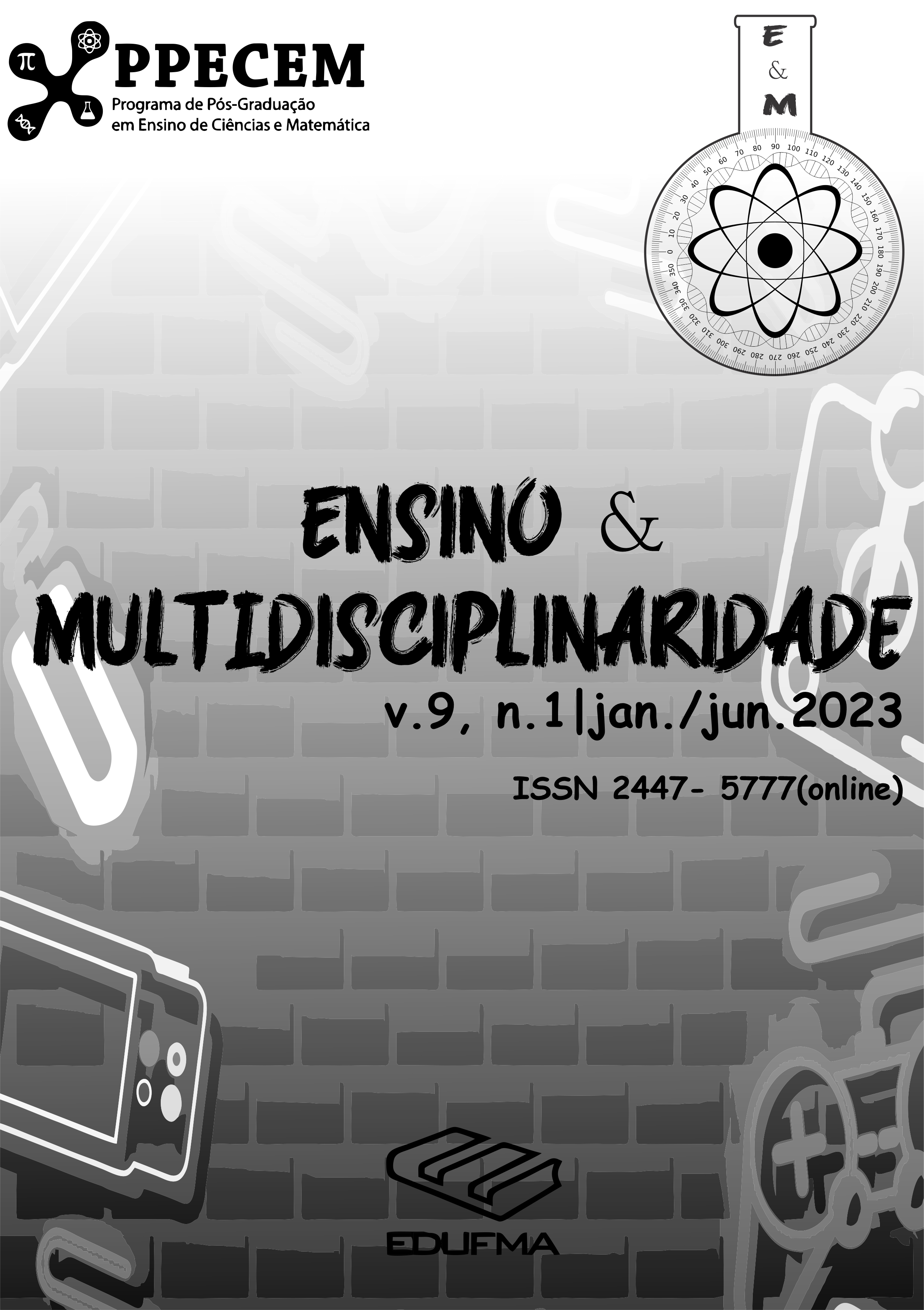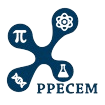A motivação dos professores na elaboração de atividades que incluam estudantes neurodivergentes: A importância do brincar
DOI:
https://doi.org/10.18764/2447-5777v9n1.2023.1Palabras clave:
Autismo , Educação Matemática , Ludicidade , NeurodiversidadeResumen
Apresenta-se um estudo de natureza qualitativa realizado com o objetivo de ampliar o conhecimento na educação matemática brasileira sobre o lúdico no âmbito do ensino de matemática com perspectiva inclusiva. Para isso, foca em uma discussão sobre os estudantes neurodivergentes, ancorando-se no movimento da neurodiversidade e seus princípios teóricos. O problema de pesquisa foi definido com a seguinte pergunta: como motivar os professores de educação básica no contexto de formação continuada a elaborarem propostas didáticas de matemática que sejam lúdicas e que contribuam para a inclusão de estudantes neurodivergentes? A metodologia foi estruturada por meio de uma oficina envolvendo professores de educação básica da região noroeste do estado de São Paulo, em que foram produzidos dados no formato de diário de anotações, fotografias e respostas em um formulário online. Como resultado, o estudo aponta que a motivação dos professores se dá principalmente por meio de exemplos dados pelos pares no contexto de formação continuada.
Teachers’ motivation in developing activities that include neurodivergent students: The importance of playing
Abstract
It presents a qualitative study carried out with the objective of expanding the existing knowledge in Brazilian mathematics education about the ludic in the context of teaching mathematics with an inclusive perspective. For this, it focuses on a discussion about neurodivergent students, anchoring itself in the neurodiversity movement and its theoretical principles. The research problem was defined with the following question: how to motivate basic education teachers in the context of continuing education to develop didactic proposals for mathematics that are playful and that contribute to the inclusion of neurodivergent students? The methodology was structured through a workshop involving basic education teachers from the northwest region of the state of São Paulo, in which data were produced in the form of a diary of notes, photographs, and answers given in an online form. As a result, the study points out that teachers’ motivation occurs mainly through examples that are given by peers in the context of continuing education.
Descargas
Citas
ARAUJO, M. L. F. et al. Alfabetização matemática de alunos com transtorno do espectro autista. Ensino e Multidisciplinaridade, São Luís, v. 5, n. 1, p. 33-52, 2019.
BOSA, C. A. Autismo, atuais interpretações para antigas observações. In: BAPTISTA, C. R.; BOSA, C. A. (Orgs.). Autismo e educação: reflexões e propostas de intervenção. Porto Alegre: Artmed, 2002.
CAMINHA, R. C. Autismo: um transtorno de natureza sensorial? 2008. 71 f Dissertação (Mestrado em Psicologia) – Centro de Teologia e Ciências Humanas, Pontifícia Universidade Católica do Rio de Janeiro, Rio de Janeiro, 2008.
CIPRIANO, M. S.; ALMEIDA, M. T. P. O brincar como intervenção no transtorno do espectro do autismo. Extensão em Ação, Fortaleza, v. 2, n. 11, p. 78-91, 2016. https://doi.org/10.32356/exta.v2.n11.11832
FIVES, H.; BUEHL, M. M. Teacher motivation: self-efficacy and goal orientation. In: WENTZEL, K. R.; MIELE, D. B. (Eds.). Handbook of motivation at school. Nova York: Routledge, 2016. p. 340-360.
FLANNERY, K. A.; WISNER-CARLSON, R. Autism and education. Child and Adolescent Psychiatric Clinics of North America, v. 29, n. 2, p. 319-343, 2020. https://doi.org/10.1016/j.chc.2019.12.005
FUERTES, M. et al. Momentos de interação em que as emoções se apre(e)ndem: estudo exploratório sobre a prestação materna e infantil em jogo livre. Psicologia USP, São Paulo, v. 21, n. 4, p. 833-857, 2010. https://doi.org/10.1590/S0103-65642010000400010
GOLDIN, G. A. et al. Attitudes, beliefs, motivation and identity in mathematics education: an overview of the field and future directions. (ICME-13 Topical Surveys). Cham: Springer, 2016. https://doi.org/10.1007/978-3-319-32811-9
HACKING, I. Autistic autobiography. Philosophical Transactions B, v. 364, n. 1522, p. 1467-1473, 2009. https://doi.org/10.1098/rstb.2008.0329
HAN, J.; YIN, H. Teacher motivation: definition, research development and implications for teachers. Cogent Education, v. 3, n. 1, p. 1217819, 2016. https://doi.org/10.1080/2331186X.2016.1217819
HRDY, S. B. Mothers and others: the evolutionary origins of mutual understanding. Cambridge: Harvard University Press, 2009.
IBCCES. Interview with Dr. Stephen Shore: autismo advocate e on the spectrum. IBCCES, 2018. Disponível em: https://ibcces.org/blog/2018/03/23/12748/. Acesso em: 20 mai. 2023.
JESUS, S. N.; LENS, W. An integrated model for the study of teacher motivation. Applied Psychology, v. 54, n. 1, p. 119-134, 2005. https://doi.org/10.1111/j.1464-0597.2005.00199.x
KAMPS, D. M. et al. Teaching social skills to students with autismo to increase peer interactions in an integrated first-grade classroom. Journal of Applied Bahavior Analysis, v. 25, n. 2, p. 281-288, 1992. https://doi.org/10.1901/jaba.1992.25-281
KIRMAYER, L. J.; WORTHMAN, C. M.; KITAYAMA, S. Introduction. In: KIRMAYER, L. J. et al. (Eds.). Culture, mind, and brain: emerging concepts, models, and applications. Cambridge: Cambridge University Press, 2020. p. 1-50. https://doi.org/10.1017/9781108695374.002
KOK, A. J.; KONG, T. Y.; BERNARD-OPITZ, V. A comparison of the effects of structured play and facilitated play approaches on preschoolers with autism: a case study. Autism, v. 6, n. 2, p. 181-196, 2002. https://doi.org/10.1177/1362361302006002005
KONNER, M. The Evolution of childhood: relationships, emotion, mind. Cambridge: The Belknap Press, 2010. https://doi.org/10.2307/j.ctv1p6hnrx
MIDDLETON, J. A.; SPANIAS, P. A. Motivation for achievement in mathematics: findings, generalizations, and criticisms of the research. Journal for Research in Mathematics Education, v. 30, n. 1, p. 65-88, 1999. https://doi.org/10.2307/749630
NELSON, C. et al. Keys top play: a strategy to increase the social interactions of Young children with autism and their typically developing peers. Education and Training in Developmental Disabilities, v. 42, n. 2, p. 165-181, 2007.
PENATIERI, T. B. V.; CHICON, J. F.; ARAUJO, F. Z. A intervenção educativa na brincadeira da criança com autismo. Revista Educação Especial em Debate, Vitória, v. 4, n. 8, p. 22-37, 2019.
PINTO, G. U.; GÓES, M. C. R. Deficiência mental, imaginação e mediação social: um estudo sobre o brincar. Revista Brasileira de Educação Especial, Bauru, v. 12, n. 1, p. 11-28, 2006. https://doi.org/10.1590/S1413-65382006000100003
REDERD, B. F.; SANTOS, R. P. L.; HEES, L. W. B. Autismo diante do raciocínio lógico matemático: fatores determinantes e métodos de intervenção. Ensaios Pedagógicos, Sorocaba, v. 2, n. 1, p. 113-124, 2018.
RIOS, C. et al. Da invisibilidade à epidemia: a construção do autismo na mídia impressa brasileira. Interface: Comunicação, Saúde, Educação, Botucatu, v. 19, n. 53, p. 325-335, 2015. https://doi.org/10.1590/1807-57622014.0146
SANINI, C.; SIFUENTES, M.; BOSA, C. A. Competência social e autismo: o papel do contexto da brincadeira com pares. Psicologia: Teoria e Pesquisa, Brasília, v. 29, n. 1, p. 99-105, 2013. https://doi.org/10.1590/S0102-37722013000100012
STEVENSON, E. G. J.; WORTHMAN, C. M. Child well-being: anthropological perspectives. In: BEM-ARIEH, A. et al. (Eds.). Handbook of child well-being: theories, methods and policies in global perspectives. Nova York: Springer, 2014. p. 485-512. https://doi.org/10.1007/978-90-481-9063-8_20
WHITAKER, P. Fostering communication and shared play between mainstream peers and children with autism: approaches, outcomes and experiences. British Journal of Special Education, Tamworth, v. 31, n. 4, p. 215-222, 2004. https://doi.org/10.1111/j.0952-3383.2004.00357.x
WORTHMAN, C. M. The ecology of human development: evolving models for cultural psychology. Journal for Cross-Cultural Psychology, v. 41, n. 4, p. 546-562, 2010. https://doi.org/10.1177/0022022110362627
Descargas
Publicado
Cómo citar
Número
Sección
Licencia
Derechos de autor 2023 Ensino & Multidisciplinaridade

Esta obra está bajo una licencia internacional Creative Commons Atribución 4.0.
Autores que publicam nesta revista concordam com os seguintes termos:
a. Autores mantém os direitos autorais e concedem à revista o direito de primeira publicação, com o trabalho simultaneamente licenciado sob a Licença Creative Commons CC BY que permite o compartilhamento do trabalho com reconhecimento da autoria e publicação inicial nesta revista.
b. Autores têm autorização para assumir contratos adicionais separadamente, para distribuição não-exclusiva da versão do trabalho publicada nesta revista (ex.: publicar em repositório institucional ou como capítulo de livro), com reconhecimento de autoria e publicação inicial nesta revista.
c. Autores têm permissão e são estimulados a publicar e distribuir seu trabalho online (ex.: em repositórios institucionais ou na sua página pessoal) após a publicação final do manuscrito.



















